Intel Core i7-10700 vs Core i7-10700K Review: Is 65W Comet Lake an Option?
by Dr. Ian Cutress on January 21, 2021 10:30 AM EST- Posted in
- CPUs
- Intel
- Core i7
- Z490
- 10th Gen Core
- Comet Lake
- i7-10700K
- i7-10700
CPU Tests: Legacy and Web
In order to gather data to compare with older benchmarks, we are still keeping a number of tests under our ‘legacy’ section. This includes all the former major versions of CineBench (R15, R11.5, R10) as well as x264 HD 3.0 and the first very naïve version of 3DPM v2.1. We won’t be transferring the data over from the old testing into Bench, otherwise it would be populated with 200 CPUs with only one data point, so it will fill up as we test more CPUs like the others.
The other section here is our web tests.
Web Tests: Kraken, Octane, and Speedometer
Benchmarking using web tools is always a bit difficult. Browsers change almost daily, and the way the web is used changes even quicker. While there is some scope for advanced computational based benchmarks, most users care about responsiveness, which requires a strong back-end to work quickly to provide on the front-end. The benchmarks we chose for our web tests are essentially industry standards – at least once upon a time.
It should be noted that for each test, the browser is closed and re-opened a new with a fresh cache. We use a fixed Chromium version for our tests with the update capabilities removed to ensure consistency.
Mozilla Kraken 1.1
Kraken is a 2010 benchmark from Mozilla and does a series of JavaScript tests. These tests are a little more involved than previous tests, looking at artificial intelligence, audio manipulation, image manipulation, json parsing, and cryptographic functions. The benchmark starts with an initial download of data for the audio and imaging, and then runs through 10 times giving a timed result.
We loop through the 10-run test four times (so that’s a total of 40 runs), and average the four end-results. The result is given as time to complete the test, and we’re reaching a slow asymptotic limit with regards the highest IPC processors.

Google Octane 2.0
Our second test is also JavaScript based, but uses a lot more variation of newer JS techniques, such as object-oriented programming, kernel simulation, object creation/destruction, garbage collection, array manipulations, compiler latency and code execution.
Octane was developed after the discontinuation of other tests, with the goal of being more web-like than previous tests. It has been a popular benchmark, making it an obvious target for optimizations in the JavaScript engines. Ultimately it was retired in early 2017 due to this, although it is still widely used as a tool to determine general CPU performance in a number of web tasks.
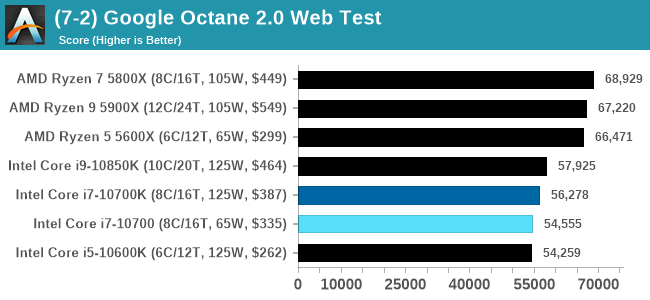
Speedometer 2: JavaScript Frameworks
Our newest web test is Speedometer 2, which is a test over a series of JavaScript frameworks to do three simple things: built a list, enable each item in the list, and remove the list. All the frameworks implement the same visual cues, but obviously apply them from different coding angles.
Our test goes through the list of frameworks, and produces a final score indicative of ‘rpm’, one of the benchmarks internal metrics.
We repeat over the benchmark for a dozen loops, taking the average of the last five.
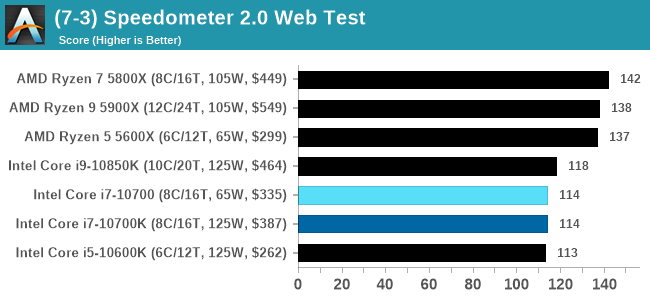
Legacy Tests
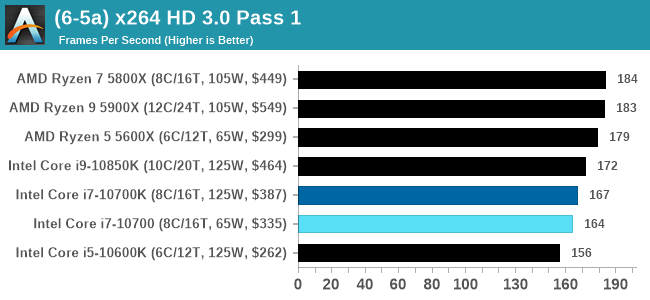
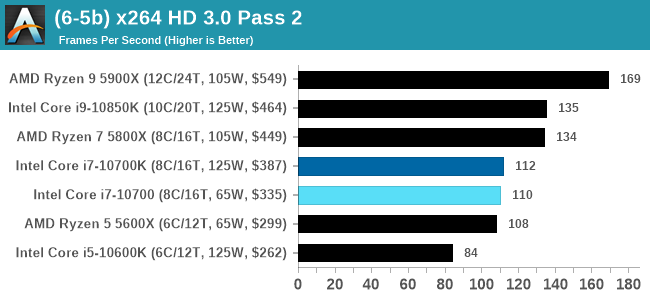
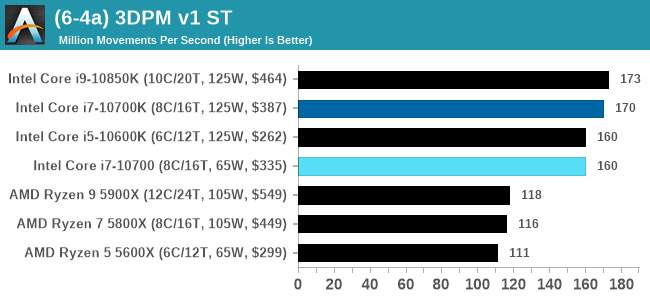
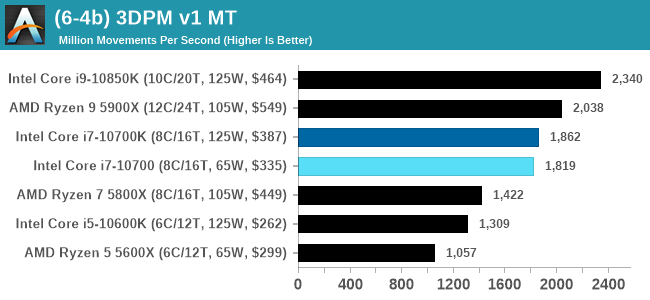
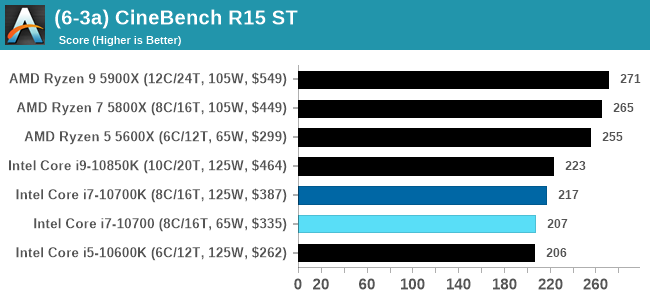
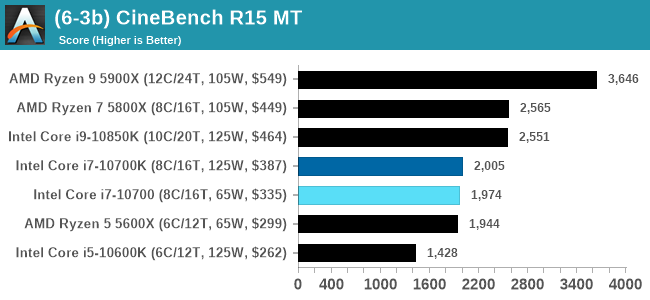


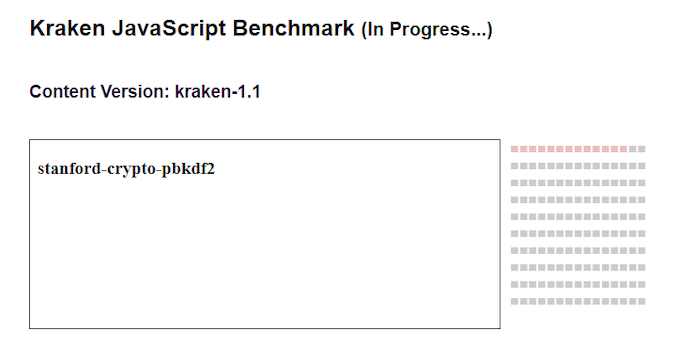
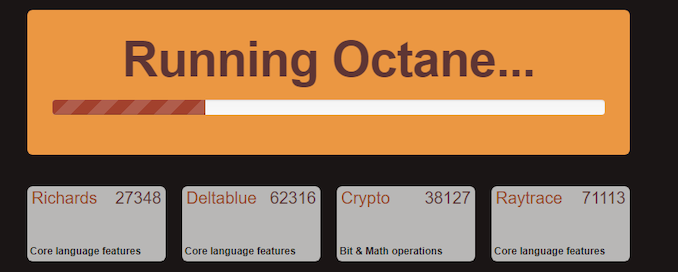
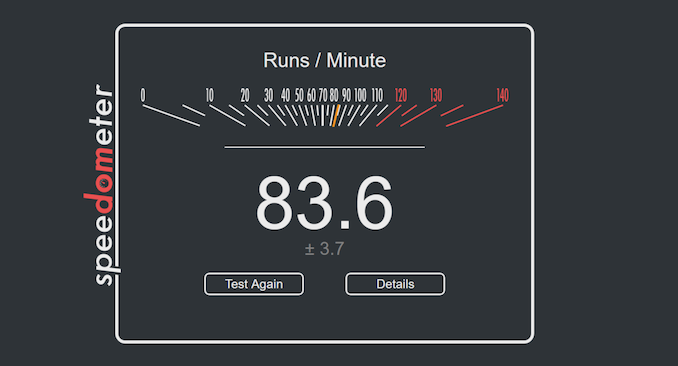








210 Comments
View All Comments
Spunjji - Monday, January 25, 2021 - link
Assuming makes an ass out of, well, just you in this case.You replied to - and agreed with - a comment from someone who clearly didn't properly read the article, because their complaints were addressed within the article.
I can't "refute" your personal opinions because they were just that; opinions. I can - and did - freely imply that I think they're bad opinions and are based around motivated reasoning. If you think that backs you up, you're even less logical than this "debate me" shtick implies.
Spunjji - Friday, January 22, 2021 - link
That is, in fact, mentioned in the article. If only people would read before commenting.hansip87 - Thursday, January 21, 2021 - link
One of the things i wonder is, with Asrock Turbo Unlock only allows 125W max (z490m itx ac), will it be worth the money to purchase the K version just so we can tinker with the PL1&2 value? I mean, compared to 6core which can make do with 125watt, 8 core should go around 160w. The motherboard used here might allow TDP bigger than 125w load but what happened with boards that do limit them only with 125watt?Endymio - Thursday, January 21, 2021 - link
-> "Also when it comes to benchmarking, because if we were to take an extreme view of everything, then benchmarking is pointless and I'm out of a job."A very good article, but the above sentence is syntactic gibberish. There are several other grammatical errors/typos that an editor -- or even good editing software -- should have caught.
MDD1963 - Thursday, January 21, 2021 - link
At any point, did anyone perhaps run HWmonitor to see what clock speeds were being achieved on the 10700? If only 100 MHz less than the 10700K, clearly we are NOT running in a true 65W TDP envelope...MDD1963 - Thursday, January 21, 2021 - link
Many folks still referred to the R7-1700X as a 65 watt CPU when running it at 3.9 GHz in it clearly drawing 140-165W from the wall at load...same as the 1800X. (I'm sure criticisms flew equally Team Red back then, right?) :)zeealpal - Thursday, January 21, 2021 - link
Everywhere I look references the R7-1700X TDP as 95W not 65W? With ~108W full package power draw at load https://www.anandtech.com/bench/product/2281shabby - Thursday, January 21, 2021 - link
Fake news...Spunjji - Friday, January 22, 2021 - link
Nice FUD / JAQing off combo you're doing, there! 😑The 1700 had a 65W TDP, and it drew ~45W in games and ~82W running Prime 95.
The 1700X and 1800X had a 95W TDP and drew ~105W and ~113W in Prime 95, respectively
Those chips were pretty roundly criticised for their low power efficiency vs. Intel in lightly threaded workloads at the time. 👍
eastcoast_pete - Thursday, January 21, 2021 - link
This might be a too simple-minded approach, but even the most overdone power regulation will run into the declared thermal limit if the heatsink that is used is speced according to the declared "TdP". So, if you'd give a "65Wh CPU" a heatsink that can only dissipate 65 Wh sustained, the CPU would run into it's thermal shutdown temperature. That would unmask mislabeled CPUs quickly. Just a suggestion.